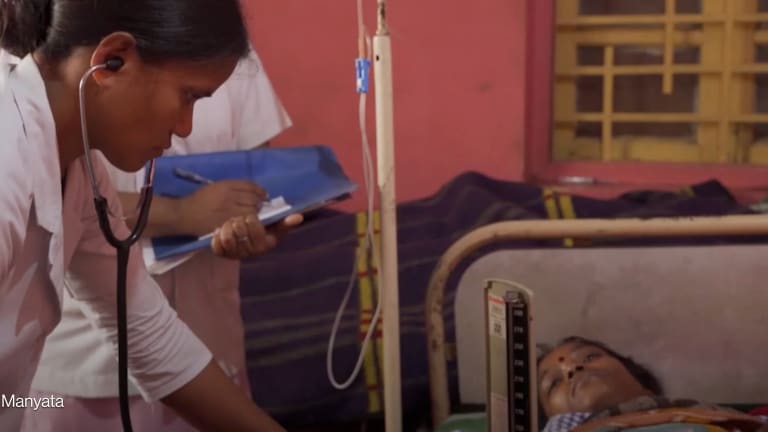
According to the most recent figures from the United Nations Population Fund, more than $100 billion in investments are needed to end preventable maternal deaths by 2030. While many working across health care have responded to the maternal health crisis, progress has been slow and, in some instances, regressed.
A panel discussion titled “Maternity Matters: Unlocking private sector fiscal capacity for health system response,” held at the 77th session of the World Health Assembly in Geneva, examined the current state of maternal health and the challenges in delivering a responsive, sustainable health system to address and finance the maternal health gaps across the African continent. Among the esteemed panel of speakers were government representatives Dr. Austin Demby, Sierra Leone’s minister of Health and Sanitation, and Dr. Patrick Amoth, director-general for health in Kenya’s Ministry of Health.
The event highlighted challenges for health systems such as access to quality care, digital transformation, and stronger governance across the public and private sectors. Given the depth and magnitude of these challenges, which are unique to each country, governments have sought to strategically engage the private sector in addressing health system gaps and unlock private capital, investments, and expertise.
At this point, there is global understanding and recognition of the integral role the private sector holds within mixed health systems in addressing barriers to maternal health care. Their role includes service delivery — broadening and enabling access to high-quality maternal care — and delivering necessary commodities such as medicines and supplies to prevent and treat postpartum hemorrhage, which is the largest global cause of maternal deaths. The private sector is also pivotal in addressing health system gaps such as digital information systems needed to improve efficiency and productivity to advance health outcomes.
With an estimated $240 trillion in funding available from capital markets, mobilizing only 1% of this would address the entire Sustainable Development Goal funding gap. Moving forward, governments have an opportunity to strategically engage the private sector to address health system gaps, unlock private capital, and leverage additional capabilities and expertise to accelerate progress.
The event hosted by Devex, MSD for Mothers, and the World Health Organization’s Country Connector on Private Sector in Health featured experts and government leaders who explored how more collaborative engagement with the local private sector can advance equitable access to quality maternal health care in low- and middle-income countries. The discussion came at an important time, as financing for health is increasingly challenging, even though all the countries represented increased their health budgets over the last fiscal year. Here are some highlights from the discussion:
Public and private sectors need to adopt a collaborative, united front
A crucial first step is understanding the importance of governance. The lack of governance of mixed health systems, which include both the public and private sectors, is impeding the progress to advance public health goals. Developing the right policies will be important to enable more direct engagement with the private sector and ensure that their capacity can be strategically integrated into governments’ overall responses and unlock expertise to address gaps in the delivery of health care.
Dr. Amoth highlighted the significant progress Kenya has made in recent years. However, as the country continues to manage high maternal mortality rates, he acknowledged how supplemental support from the private sector is needed for more meaningful progress. “In Kenya, public health facilities deliver 50% of the health service delivery and private and faith-based organizations deliver the other 50%. In terms of service delivery, the private sector is critical going forward as we journey towards the achievement of Universal Health Coverage,” he said.
Another example can be seen in the country of Nigeria, where functional facilities are lacking. Of the 34,000 facilities that are defined as primary health care facilities, both private and publicly funded, less than 2,000 have met the requirements of basic maternal care services, where a woman can walk into a facility and safely deliver her baby. Over the next several years, the government is working to increase this number to 17,600 through infrastructure improvements, workforce training, and proper equipment. However, these goals cannot be reached without the injection of funds through grants or investments.
To help bridge the gaps and meet the level of health care investment necessary, the full capacity of the private sector needs to be maximized not only in terms of financing but also delivery of care and innovation to augment health system capacity, productivity, and efficiencies. We need to put ourselves in the shoes of mothers, listening to their concerns, so we can provide quality care that can save lives.
Digitization isn’t a luxury, it’s a requirement
Panelists also shed light on the significant number of services provided by the private sector but noted that many challenges persist.
One challenge rising to the forefront is the lack of visibility of data across health systems when looking to address solutions. As the delivery of care is often split between the public and private sectors, each group is managing its own data. There is currently a lack of means for digital transformation and data sharing across groups to help identify ongoing issues across both sectors and integrate the proper solutions, especially as women are often interacting with both in their lives.

Dr. Demby reflected on his work in Sierra Leone where the government is leveraging data to help institute patient-centered care. The government has developed a color-coding system to identify regions where there may be opportunities to improve care and outcomes quickly for maternal health.
However, there are still gaps that the government alone cannot address with their current capabilities. Dr. Demby noted that, as a next step, they are working to truly understand how the social determinants of health impact pregnancy and health care overall. This “requires more than an Excel sheet,” Dr. Demby shared as a call for the private sector to help amplify these solutions throughout the African continent.
Tailoring innovations to meet local needs to achieve long-term, sustainable solutions
The private sector is innovative on a larger scale, and it is clear solutions cannot be one-size-fits-all. The public sector offers a critical perspective on the means behind the implementation of new solutions for local communities.
How WHO’s country connector is enhancing health system resilience
World Health Organization’s David Clarke explains how investing in governance capabilities contributes to improving health systems performance and long-term overall health system resilience.
Dr. Sanjana Bhardwaj, deputy director for program advocacy and communications at the Bill & Melinda Gates Foundation, noted the importance of bringing together both the public and private sectors from the beginning to develop solutions and understand the issues. “When the whole piece of work is done together and you’re deliberately bringing people in from the onset, it creates a partnership that is much stronger in terms of going forward together.” By assessing the implementation of delivery and impact together, effective and sustainable solutions can be developed and deployed to help improve maternal health care.
Act with ‘laser focus’ to improve health systems and care for the most vulnerable women
To close the session, David Clarke, acting unit head for health systems governance and policy at WHO, reflected on WHO’s Country Connector on Private Sector Health’s work to strengthen the capacity of governments to better govern mixed health systems for public health goals. There is awareness and recognition of the massive opportunity that comes with leveraging the private sector for improvements in maternal health outcomes, but it is important to now act with “laser focus” to improve health systems and care in countries where women are most vulnerable.
“Every pregnancy counts,” stated Dr. Demby. Both the public and private sectors have room to improve and now is the time to hold each other accountable as we strive to achieve the SDGs by 2030.
For more commentary on the ways countries can engage with the private sector and thereby advance equitable access to high-quality, respectful maternal health care check out a recent panel discussing how the private sector can advance equitable access to care.
The Funding the Future series is supported by funding from MSD, through its MSD for Mothers program, and is the sole responsibility of the authors. MSD for Mothers is an initiative of Merck & Co. Inc., in Rahway, N.J., U.S.
Join the conversation on finding private sector solutions to improve health service delivery for reproductive, maternal, newborn, child, and adolescent health, or RMNCAH.









